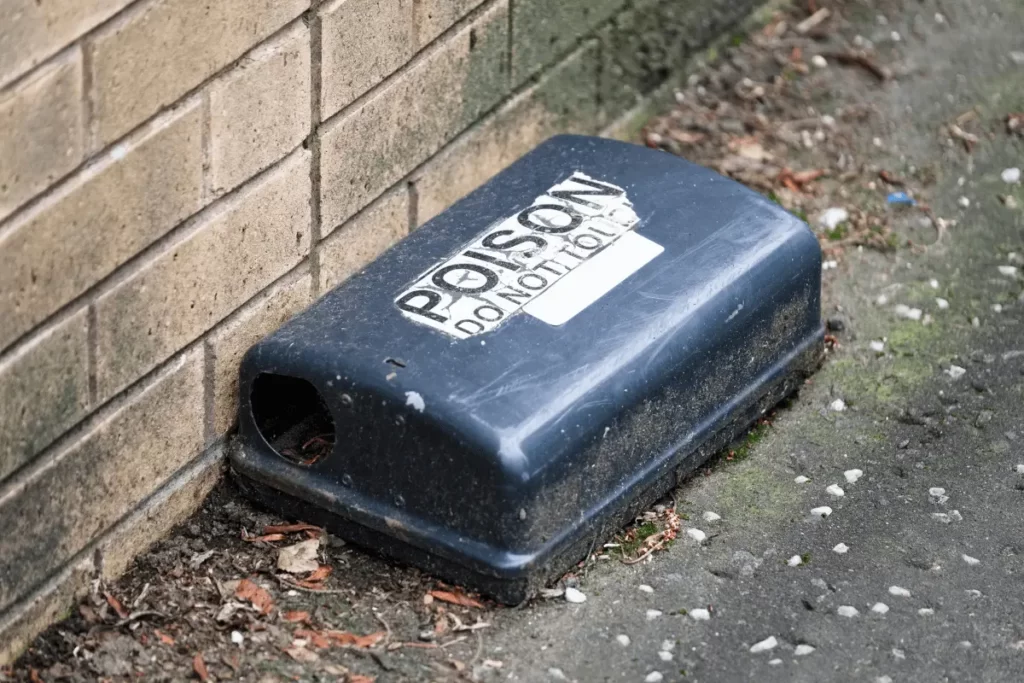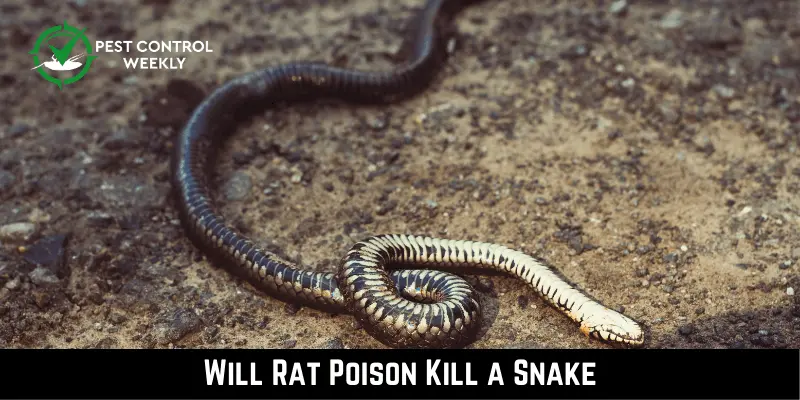When snakes start slithering into yards and houses, they become a major annoyance to homeowners. Rat poison is commonly used to control rodent populations, but will rat poison kill a snake?
Quick Answer
Although rat poison is meant for killing rats and mice, it may have the same effect on snakes if they eat a rat or mouse that has been poisoned with rat poison. Secondary poisoning happens when the rat’s poisonous compounds hurt the snake’s physiology.
Although rat poison is meant for killing rats and mice, it may have the same effect on snakes if they eat a rat or mouse that has been poisoned with rat poison. Secondary poisoning happens when the rat’s poisonous compounds hurt the snake’s physiology.
In this article, we’ll look at whether or not rat poison can kill a snake, and we’ll also discuss several alternatives to rat poison that may be used to get rid of snakes.
Rat Poison and Snakes

Rat Poison Types
Several different kinds of rat poison exist, each with its chemical properties that effectively kill those troublesome rodents. Rat poisons can either be anticoagulant or non-anticoagulant.
Anticoagulant Rat Poisons
As mentioned in chapter 46 of Veterinary Toxicology (Third Edition) anticoagulant rat poisons, such as warfarin, brodifacoum, and bromadiolone, prevent the body from being able to form blood clots, which lead to internal bleeding and, ultimately, death. They reduce the body’s supply of clotting factors by interfering with the vitamin K cycle.
Non-Anticoagulant Rat Poisons
As mentioned in Chapter 47 of Veterinary Toxicology (Third Edition) non-anticoagulant rat poisons, such as bromethalin, cholecalciferol, and zinc phosphide, use a variety of mechanisms to kill rodents. Bromethalin, for example, disrupts neurological function by increasing intracellular calcium levels, while cholecalciferol raises calcium levels to toxic levels.
How Does Rat Poison Work?
Anticoagulant Rat Poisons
- These chemicals work covertly by inhibiting vitamin K recycling in the liver, preventing the generation of critical clotting components.
- Therefore, the injured mouse has internal bleeding that cannot be stopped, ultimately leading to death. Even if snakes aren’t the primary target, they can still be poisoned due to eating poisoned prey.
Non-Anticoagulant Rat Poisons
- Bromethalin is a potent neurotoxin that paralyzes and kills rodents by blocking their cells from producing adenosine triphosphate (ATP). When snakes eat poisoned rodents, they risk experiencing the same neurological repercussions.
- Calcification of soft tissues and organs occurs after ingesting cholecalciferol because it increases blood levels of calcium and phosphorus. In rodents, this causes renal failure and death. High calcium levels may be harmful to snakes that feed on these rodents.
- When zinc phosphate comes into contact with stomach acid, it produces phosphine gas, which is extremely poisonous. It leads to respiratory discomfort and mortality in rodents. There is a risk that snakes will become poisoned if they consume rodents dosed with phosphine.
The Effect Of Rat Poison On Snakes
Indirect Poisoning
Due to their mysterious interactions with rodents, snakes are at risk of indirect poisoning. Snakes unknowingly expose themselves to the harmful effects of rat poison when they swallow rodents that have already consumed it. Factors like the snake’s size, metabolism, and the nature of the poison itself affect the severity of the secondary poisoning.
The snake may develop neurological problems, organ failure, or possibly die. Accidental poisoning of snakes by rats can have far-reaching consequences for the ecosystem, upsetting the equilibrium between predators and prey.
Direct Poisoning
Direct poisoning of snakes by rat poison is not very frequent, although it can happen if the snake encounters the poison. Because of their curiosity, these reptiles may eat or absorb the poison when exploring bait stations or walking across infected surfaces. The results of direct poisoning can range from little pain to fatalities, depending on the type of poison and the amount.
Paralysis or convulsions may result from some snake toxins, while others may cause internal bleeding or organ failure. Direct poisoning is a major hazard to snake populations since it endangers individual snakes and might disrupt the delicate ecological balance that relies on their predatory function.
Alternatives to Rat Poison
Snake Repellents
Snake repellents are a novel and environmentally friendly option for protecting snakes from the dangers of rat poison. Natural components like aromatic oils or naphthalene are used in these repellents to establish an olfactory barrier that prevents snakes from entering a certain location. In addition, the vibrations and noises emitted by ultrasonic devices are unpleasant to snakes, so they avoid areas where they are used. Using these natural products, homeowners may protect their homes against snakes without endangering the animals or upsetting the ecosystem’s delicate balance.
Habitat Modification
Altering the snakes’ environment is another ingenious method of protecting them from rat poison. To prevent snakes from entering a building, it is important to get rid of things like thick grass, litter, and rodent nesting areas. Even more, preventative measures include sealing building entrances and constructing snake-proof fencing. In addition to preventing snakes from being poisoned, habitat alteration methods promote peaceful cohabitation between people and other species.
Professional Snake Removal
A compassionate and ethical alternative to using rat poison is hiring a professional snake removal service when a snake infestation is a serious problem. Capturing and relocating snakes requires specialized expertise, training, and equipment, all of which wildlife managers have. These experts are also a great resource for guidance on how to avoid more snake infestations in the future. By contracting with a professional snake removal service, homeowners may put their fears of snakes to rest while supporting ethical wildlife management techniques and maintaining a healthy ecosystem.
Safe Pest Control Methods
Rodent Traps
Using rodent traps instead of rat poison is an eco-friendly and responsible solution to the problem of poisoned snakes. There are several non-chemical methods of catching rodents, including snap traps, glue traps, and live capture traps.
People may efficiently reduce rodent populations while avoiding the danger of secondary poisoning by properly putting these devices in places frequented by rats and utilizing appropriate bait. In addition to protecting snakes and the environment, rodent traps are a practical, long-term method of pest management that requires little oversight or maintenance.
Biological Control
Biological control methods introduce natural predators such as owls, hawks, and cats to keep snake populations in check. Inviting these predators into an area allows people to use their wild hunting instincts, reducing the need for artificial pesticides.
Creating habitats for natural predators, such as roosts for birds of prey and safe havens for feral cats, can be an effective, long-term, and non-toxic pest control method. This method safeguards snakes against rat poison and promotes ecological equilibrium, both vital to a healthy ecosystem.
Integrated Pest Management
IPM aims to control snake populations using as few methods as possible while protecting people, animals, and the environment as much as possible. Modifying habitat, excluding pests, cleaning up the area, and using biological controls are all parts of integrated pest management (IPM).
IPM keeps pest control sustainable and environmentally benign by keeping tabs on pest numbers and using the least damaging ways possible. This all-encompassing method not only protects snakes from the dangers of rat poison but also promotes peaceful cohabitation between humans and animals, helping to maintain the ecosystem’s delicate balance.
Can a Snake Eat Rat Poison and Still Live?
What happens to a snake when it ingests rat poison depends on several variables, including the type of poison, the amount taken, and the snake’s unique traits. Rat poison is not designed to kill snakes, but ingesting poisoned rats or coming into contact with the material can have disastrous effects on snakes.
If the amount of rat poison consumed is small or the snake has a strong immune system, it can withstand the poison’s effects. In some cases, however, the snake may have organ failure, neurological abnormalities, or even death.
The fact that a snake’s recovery from rat poison is not a given highlights the need to use safe and environmentally friendly pest management methods. The environment’s delicate balance may be maintained with alternate tactics that reduce the likelihood of harm to snakes and other non-target animals.
Conclusion
Overall, rat poison may kill snakes and other non-target animals. Snakes can die from direct poisoning or secondary poisoning by eating poisoned rodents. Pest management should be eco-friendly and compassionate to protect snakes.
Rodent traps, biological control, habitat alteration, and integrated pest management can eliminate rodents while maintaining the delicate ecological balance needed for all species. A proactive and attentive pest control method protects snakes and promotes harmony between humans and animals, creating a better and more sustainable environment for future generations.
FAQs
References
Michael J. Murphy, Chapter 46 – Anticoagulant Rodenticides, Editor(s): Ramesh C. Gupta, Veterinary Toxicology (Third Edition), Academic Press, 2018, Pages 583-612,
ISBN 9780128114100, https://doi.org/10.1016/B978-0-12-811410-0.00046-5.
Ramesh C. Gupta, Chapter 47 – Non-Anticoagulant Rodenticides, Editor(s): Ramesh C. Gupta, Veterinary Toxicology (Third Edition), Academic Press, 2018, Pages 613-626, ISBN 9780128114100, https://doi.org/10.1016/B978-0-12-811410-0.00047-7.
